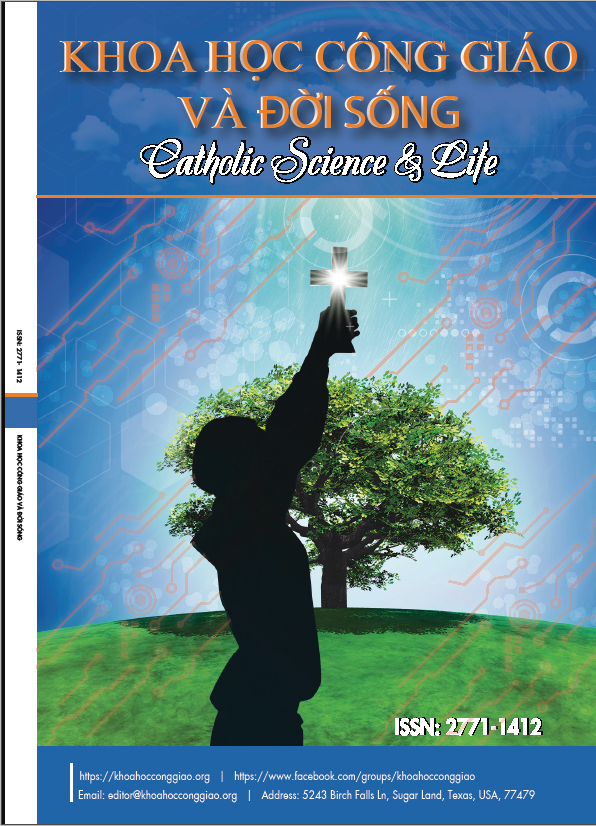Sợ Thiên Chúa bỏ rơi khiến nói khích cả Thiên Chúa
Phân tích Tv 88: 10b-13
DOI:
https://doi.org/10.54855/csl.22223Từ khóa:
sợ hãi, chất vấn, Thiên Chúa, “nói khích”, sầu khổ và an ủiTóm tắt
Trong thời Cựu Ước, người Do thái đã tin rằng Thiên Chúa là một Đấng thưởng phạt con người tùy theo công trạng hay lỗi lầm của họ. Nên họ vừa tôn thờ Thiên Chúa nhưng cũng vừa sợ hãi Đấng họ tôn thờ, bởi vì họ cho rằng Thiên Chúa chính là nguyên nhân gây ra đau khổ. Sách các Thánh Vịnh dành một vài chương để diễn tả tư tưởng này. Đặc biệt, Tv 88 được coi như là một cuộc đối thoại của người Do thái với Thiên Chúa của họ về sự đau khổ. Cuộc đối thoại này được đẩy tới cao trào bằng những lời chất vấn của vịnh gia dành cho Thiên Chúa rằng, tại sao Ngài lại để cho mình phải gánh chịu quá nhiều đau khổ? Cao trào của lời chất vấn ấy đã làm lộ rõ vấn nạn của con người: Sợ bị Thiên Chúa bỏ rơi đến nỗi phải “nói khích” cả Thiên Chúa.
Trong bài viết này, đầu tiên là phân tích bản văn Tv 88. Kế đến là phần đào sâu sứ điệp thần học của bản văn xoay quanh chủ đề nỗi sợ bị Thiên Chúa bỏ rơi. Cuối cùng là phần suy tư và phản tỉnh thần học liên hệ đến đời sống thực tế của con người trong mối tương quan với Thiên Chúa và với nỗi sợ của mình.
Fear of God's abandonment leads to provoke God - Analysis of Psalm 88: 10b-13
In the Old Testament, the Jews believed in a God who rewarded and punished individuals based on their deeds or transgressions. Thus, they adore God but also dread Him, believing that God is the source of their pain. Several chapters of the Book of Psalms are devoted to articulating this notion. Psalm 88, in particular, is viewed as a discourse between the Jews and their God regarding suffering. The psalmist concludes this discourse by asking God why he allows himself to endure so much. The question's finale showed a human issue: fear of being abandoned by God that leads to "provoke" God.
We begin this study by analyzing the text of Ps 88. Following that, we'll examine the text's theological content, which centers on the terror of God's departure. Finally, there is theological study and meditation on man's actual relationship with God and his worries.
Keywords: fear, questioning, God, “provoking”, sorrow and consolation
Tài liệu tham khảo
John Day (1999). Psalms. New York: T&T Clark, 19-27.
Allen P. Ross (2016). A Commentary on the Psalms. Grand Rapids: Kregel Publications, 805-807.
James Limburg (2000). Psalms. Louisville: Westminster John Knox Press, 297-298.
F-L Hossfeld and E Zenger (2005). Psalms 2: A Commentary on Psalms 51-100, Second edition, edited by Baltzer, K. and translated by Maloney. Minneapolis: Fortress Press, 391.
J. M Boice (2005). Psalms. Grand Rapids: Baker Books, 715.
Hoàng Đắc Ánh và Trần Phúc Nhân (1997). Như Hương Trầm. HCM: Tủ sách Đại Kết, 88-89.
Kinh Thánh (2011). Kinh Thánh. Bản dịch và chú thích do Nhóm Phiên Dịch Các Giờ Kinh Phụng Vụ. Hà Nội: Nxb. Tôn Giáo, 1215.
Allen P. Ross (n.d.). A Commentary on the Psalms, 805-807.
Samuel Terrien (2003). The Psalms: Strophic Structure and Theological Commentary (Grand Rapids: Eerdmans Publishing Co., 626).
F-L Hossfeld and E Zenger (2011). Psalms 2: A Commentary on Psalms 51-100, 391.
Kinh Thánh, Ấn Bản 2011, 1045.
Kinh Thánh, Ân Bản 2011, 1215.
Tải xuống
Đã Xuất bản
Cách trích dẫn
Số
Chuyên mục
Giấy phép
Bản quyền (c) 2022 Giuse Nguyễn Văn Đức, S.J.

Tác phẩm này được cấp phép theo Giấy phép quốc tế Creative Commons Attribution-NonCommercial 4.0 .
Authors retain copyright and grant the journal the right of first publication with the work simultaneously licensed under a Creative Commons Attribution 4.0 International License that allows others to share the work with an acknowledgment of the work's authorship and initial publication in this journal.
Authors are able to enter into separate, additional contractual arrangements for the non-exclusive distribution of the journal's published version of the work (e.g., post it to an institutional repository, in a journal or publish it in a book), with an acknowledgment of its initial publication in this journal.











